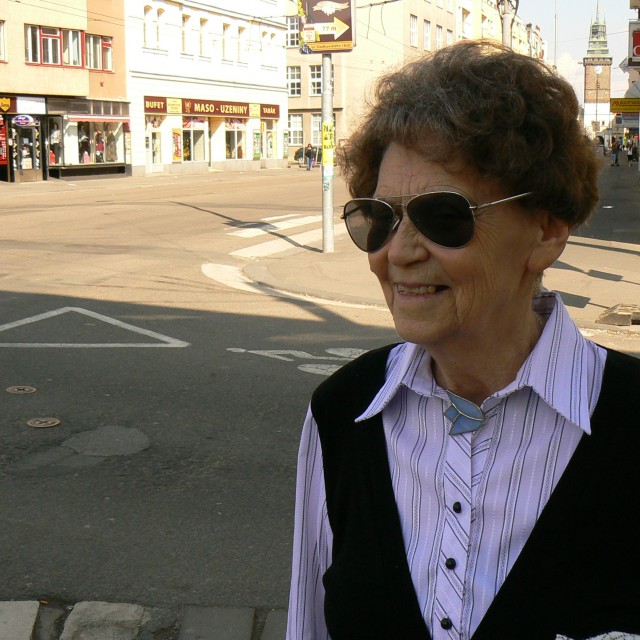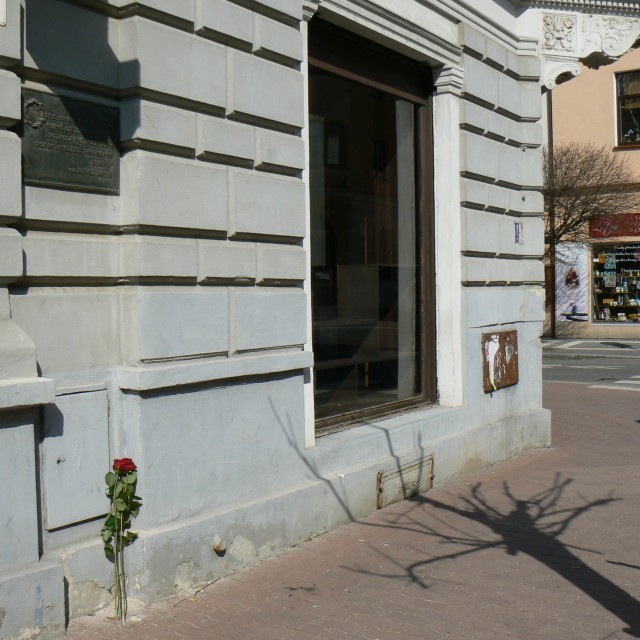They Did Not Get Him Alive
There are not many witnesses in Pardubice who recall the so-called "Heydrichiáda," (a campaign of terror against the Czech population in retaliation for the assassination of Reinhard Heydrich by an airborne unit of the exterritorial Czechoslovak army – translator’s note). The majority of people who helped the three-member paratroopers’ group Silver A were either executed at Zámeček in Pardubice or sent to concentration camps. The events of 1942 are nowadays reminded only by memorial plaques placed on various houses in Pardubice. A memorial plaque reminding us of Alfréd Bartoš, the commander of the three-member paratroopers’ group Silver A, is placed at the corner of Smilová and Sladkovského Street. The operation of this paratroopers’ group in the Pardubice region cost lives of about 200 local people. “He shot himself on this spot, when he was trying to escape from the Gestapo. He shot himself dead, because he did not want to allow the Gestapo to get him alive. He was well aware of their brutal interrogation practices,” recalls Anna Štichauerová. By coincidence, her mother-in-law happened to walk by when it occurred: “She saw how the Gestapo accidentally shot a random visitor of a cinema.”
Hodnocení
Abyste mohli hodnotit musíte se přihlásit!
Trasy
Příběh není součastí žádné trasy.
Komentáře

Paratroopers from the Silver A Group
The German revenge for the assassination of the Reichs-protector Reinhard Heydrich in 1942 was especially remorseless for the Czech people. During the reprisals, the village of Lidice was burned down on June 10, 1942. The Gestapo then continued to search for other perpetrators of Heydrich’s assassination, using the evidence provided by Karel Čurda and Viliam Gerik. A number of paratroopers’ groups from England, such as Anthropoid, Silver B, Out Distance, Bioscop, Tin and others, operated in the territory of the Protectorate of Bohemia and Moravia. A three-member paratroopers’ group called Silver A carried out its tasks in the Pardubice region. The group was commanded by first lieutenant Alfréd Bartoš who came from Pardubice, and the group therefore operated there. During the Second World War, many people, including the resistance group Čenda established in the village of Ležáky and its surroundings, decided to help the paratroopers in their fight against the Nazi occupiers. On June 16, 1942, mass arrests and executions began in the Pardubice region. Everyone who helped the paratroopers from England or approved of the assassination was to get capital punishment. Every morning, a list of people who had been executed at Zámeček the previous day was posted on the gate of the Masaryk barracks in Pardubice. Martial law was declared which prohibited people from harbouring unreported people and being outside in the evening, and obliged everyone to black out all windows. Anyone who was caught listening to the radio broadcasting from London was shot dead. The Gestapo also managed to find out the addresses of safe houses used by Alfréd Bartoš and executions at Zámeček followed shortly after. The inhabitants of Červený Kostelec were also punished for helping the paratroopers. On June 24, the Germans burned down the village of Ležáky. The commander of the Silver A group fatally shot himself in Smilova Street in Pardubice when he was trying to escape from the Gestapo. He died on June 22 in the Pardubice hospital. The deputy commander of the group, company sergeant major Josef Valčík, went into hiding after the assassination; he was hiding together with other paratroopers from the Anthropoid group, (namely along with company sergeant majors Gabčík and Kubiš), and from the Out Distance group in the crypt of the Orthodox Cathedral of Saints Cyril and Methodius in Resslova Street. All of them were either killed or they shot themselves dead on June 18, 1942. The cryptographer and radio operator corporal Jiří Potůček was shot dead by a Czech policemen on July 2, 1942, after he fell asleep in a forest by Rosice, (close to Pardubice), due to complete exhaustion. Despite the fact that Potůček left his hiding place in the house of the guard of the Ležáky quarry, moved the radio transmitter Libuše to Bohdašín, went hiding in Končiny near Červený Kostelec, and blasted his way out of the Gestapo siege at the farm of Antonín Burdych on June 30, 1942, he suffered the same destiny as his comrades and did not survive either.



